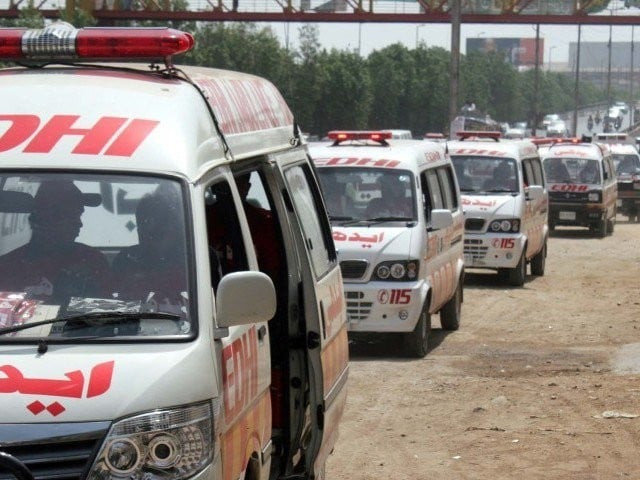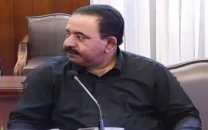Emergency vehicles to have first right on roads under proposed law
Establishment of Ziauddin University Board of Higher Secondary Education approved by Cabinet

PHOTO: FILE
The amendment, `Duty to make way for emergency vehicle', means the driver of a vehicle or any other person, to the extent practicable, shall slow down, move to the left or otherwise, make all possible efforts to give clear uninterrupted and safe passage to an emergency rescue vehicle or an ambulance with active warning lights and a siren.
The cabinet was informed that the International Committee of the Red Cross - Shaheed Zulfikar Ali Bhutto Institute of Science and Technology organised a consultative session to discuss amendments to the Motor Vehicles Ordinance, 1965 while considering the delays in shifting patients in ambulances due to traffic. It was discussed that ambulances get stuck in traffic, leaving no clear way to the hospitals, which results in death of patients. The provisions of the Motor Vehicles Rules were scrutinised for affecting the desired amendments in the existing law.
The proposed amendments were suggested under the definition of an `ambulance', where an ambulance means a vehicle designed or adopted primarily for the purpose of carrying the sick, wounded or invalid persons or animals and registered as such with the health authority. An emergency vehicle has been defined as a motor vehicle used only as law enforcement vehicle, fire-brigade or ambulance to relieve distress. A new word, 'obstruction', was added to the amendment, which means any action by a person, vehicle or otherwise that would hamper, hinder or impede the progress of another vehicle.
Universities amendment bill referred to assembly with ‘minor changes’
Other important decisions, including the appointment of National Institute of Cardiovascular Diseases (NICVD) executive director and the approval of some draft bills were also taken up by the Cabinet. The draft bills were referred to the Sindh Assembly.
The Cabinet was told that the NICVD was one of the most important institutions and it has established satellite centres in various districts.
Its director will be retiring tomorrow (Wednesday), therefore a new director may be appointed on the recommendation of the selection committee.
The Cabinet was told that the selection committee has recommended a panel of two doctors, Prof Dr Nadeem Qamar as the first choice and Prof Dr Syed Nadeem Rizvi as the second.
The Cabinet unanimously approved the appointment of Dr Qamar for another four years and directed the services secretary to issue the notification of his appointment.
Sindh cabinet moves to stall NAB functions in province
Many draft laws were approved by the Cabinet, including the Sindh Home-based Workers Act, 2018. The CM said that the government believed that the provincial policy on home-based workers is inspired by the vision of an egalitarian society, which is free of exploitation and coercion and where all citizens are equal before the law and enjoy equal rights to live with dignity and self-respect.
The draft law says that every registered home-based worker shall be entitled to social protection, medical benefits, grants and other privileges as available to a person falling within the meaning of workers and workman as envisaged in the Sindh Industrial Act, 2013.
The Cabinet approved the establishment of a 47-member Sindh Environmental Protection Council, headed by the environment minister and including secretaries of all the departments, divisional commissioners, the dean of Agriculture University, Tando Jam's plant protection faculty and two MPAs as members.
The functions of the council include approving comprehensive provincial environmental and sustainable development policies and ensuring their implementation within the framework of a conservation strategy and sustainable development plan.
Taking an oath: Saeed Ghani included in Sindh cabinet
The Cabinet also approved establishment of different committees, including industries, agriculture and other sectors.
On recommendation of the Sindh High Court chief justice, the Cabinet appointed Justice (retd) Sadiq Hussain Bhatti as the chairperson of the Sindh Environmental Protection tribunal for four years.
It also approved the appointment of two members of the tribunal, Abdul Rauf Memon, deputy director (tech) B-18 and Advocate Mohammad Arif as a member for legal matters.
The Sindh Industries Registration Act, 2018 was also approved and referred to the Assembly. The salient features of the Act include registration and de-registration of industrial undertaking, survey and inspection of industries, power to call information in public interest or order any survey or inspection and monitoring of industrial waste and pre-treatment of effluents.
The Cabinet approved the establishment of the Ziauddin University Board of Higher Secondary Education. In its meeting on December 11 last year, the Cabinet had reached some consensus that there should be some essential requirements for private education boards. It approved organisational, legal, financial and other related formalities and requirements, including the submission of a feasibility report, outlined in the general institutional requirements. These guidelines pertain to registration, availability of infrastructure and adequate financial resources, examination staff, examination criteria, affiliation criteria, fee structure, quality assurance, students' supervision, assessment and others.
The Assembly has passed the bill for regularisation of vets and sent it to the governor for his assent. The governor has made some observations to revisit the bill and ensure that upon regularisation, the veterinary doctors may not be transferred from their initial place of appointment till their position is dully filled by another vet. The Cabinet made the necessary amendment to the bill and re-referred it to the assembly.
Sindh cabinet approves multiple laws
The cabinet discussed the draft of the Sindh Regularisation of Contract Paid and Work Charged Left Bank Outfall Drain (LBOD) Employees Act, 2018. Under the proposed law, the services of 2,601 employees of LBOD will be regularised. The Cabinet approved the draft and referred it to the Assembly.
The health department presented a draft bill before the Cabinet for regularisation of doctors and other paramedic staff appointed on a contract basis. A committee was formed under Jam Khan Shoro with the health and law secretaries as its members. The committee was directed to meet and go through clauses of the draft bill so that doctors and other staff could be regularised.



















COMMENTS
Comments are moderated and generally will be posted if they are on-topic and not abusive.
For more information, please see our Comments FAQ